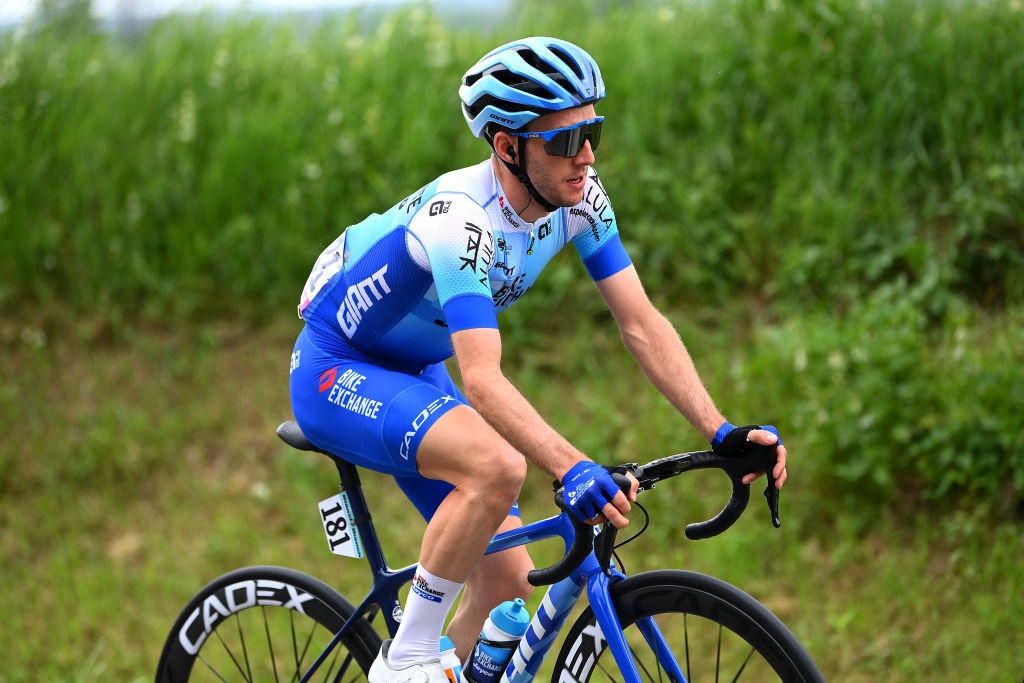'Multiple ways it can pan out' on Etna as Yates poised to take pink
BikeExchange-Jayco director White says Etna 'will show us who's in form and who's not'

Next man up? As the best placed GC contender in the standings behind Giro d'Italia leader Mathieu van der Poel, Simon Yates looks ideally positioned to claim pink on the Mount Etna on Tuesday.
Van der Poel has already signalled that, although he will try his utmost to stay in the lead, it is unlikely he will be able to survive the Giro's first major climb of 2022 on Tuesday at the top of the overall classification.
But logic and history would dictate that if Van der Poel does crack, Simon Yates – currently lying second overall at 11 seconds – would be the first to benefit. Particularly as in 2018, of course, Etna was where Yates took the jersey, and his then-teammate Esteban Chaves took the stage.
Not so fast, BikeExchange-Jayco sports director Matt White told Cyclingnews on Monday. Although Yates taking pink cannot be ruled out, as White sees it, that scenario is only one option of many on the table.
"There are lots of alternatives for tomorrow and multiple ways it could pan out. A break could stay away like it did in 2018 with Esteban [Chaves], even though Simon [Yates] got across to him," White said.
"Currently you could throw a blanket over the top five so if someone wanted to clip off the front and win with bonuses, we would not necessarily be in the jersey. It can pan out in a lot of different jerseys."
Etna itself is in no way straightforward as an ascent, which just adds to the unpredictability of it all. Tuesday's ascent is 22.8km long, with a relatively benign average of 5.9%. The steepest section, a ramp of around 14%, comes midway through the climb.
Get The Leadout Newsletter
The latest race content, interviews, features, reviews and expert buying guides, direct to your inbox!
Apart from the old cliché of never winning a Grand Tour in a first week climb as big as Etna but certainly being able to lose it, White argued that in the Giro what happens in the first week can radically alter how riders structure their strategies for their third, crucial, week of racing. It's part of a process that began on the much more benign uphill finish in Visegrád on stage 1.
"The key thing is if someone has a bad day," White told Cyclingnews "because no one wants to give away a minute here and a minute there, but some already have in the first three days alone.
"This race is never won in the first week but what happens now can put people in a position where they have to change their objectives in the last."
For some pundits, Yates, in one sense, has already delivered the kind of blow that he might have been wanting to keep until Tuesday, by winning the opening time trial in Budapest. As a result, he's moved ahead of his rivals and provided the world with a formidable, if brief, display of strength. That multiplies his options on Etna, should he choose or be forced to have to take things more calmly.
Secondly, some would say Yates' time trial performance and knowing that he can turn out that kind of ride enables the Briton to take things a little more easily in the mountains than in 2018.
White is more cautious on reading too much into Saturday's stunning time trial performance long-term in the Giro. He said a third week time trial is a very different kettle of fish, where what matters most is the legs rather than pure time trialling ability.
He highlights the case of Primož Roglič, who won the opening time trial in 2019, "and by the end of the race was on his hands and knees, he hit burn-out."
"It [Yates] time trial ride changes our tactics in the way we've had in the past because in 2018 we didn't know how good a time triallist he was. We were racing against Tom Dumoulin and Chris Froome when they were at their peak, and there was a mid-race time trial as well, three in total.
"But it's nice to know he's hit the ground running and had a little bit of competition last week, but he's not the only one who's coming here in in good form. And in the next 24 hours we'll see who they are."
Alasdair Fotheringham has been reporting on cycling since 1991. He has covered every Tour de France since 1992 bar one, as well as numerous other bike races of all shapes and sizes, ranging from the Olympic Games in 2008 to the now sadly defunct Subida a Urkiola hill climb in Spain. As well as working for Cyclingnews, he has also written for The Independent, The Guardian, ProCycling, The Express and Reuters.
